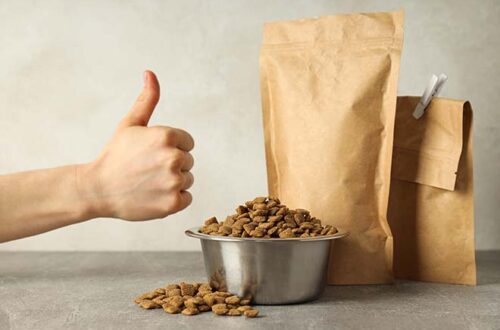Are you a new pet parent? Are you trying to figure out the right food to feed your little fluffy friend?
It’s essential to know what to feed your new puppy so you can nurture them properly. Your dog’s food needs to be balanced and healthy, giving them the energy they need to grow and play.
But what do puppies eat?
Curious as to what food to feed your new family member? We’ve got you covered.
In this guide, we’ll detail what food your new puppy needs to eat. So keep on reading, and be sure to bookmark this guide for later!
Puppy Specific Food
Food for puppies is specially formulated to ensure they receive the appropriate balance of vitamins, minerals, and nutrients. Puppies need more fat and protein in their diets to help them grow and mature into strong, healthy adult dogs.
Here are some nutrients that are needed;
More Calorie Dense and Rich
Puppies need a more calorie-dense and rich diet than their adult counterparts to fuel their rapid growth and development. Typically, puppies should be fed a premium, nutrient-rich commercial diet specially formulated to meet their growing needs. Along with puppy food, puppies can benefit from small amounts of nutritious snacks such as boiled chicken, fruits, and vegetables sprinkled with powdered vitamins and minerals.
Higher Dose of DHA
Puppies need a higher dose of DHA to support their growing brains and eyes. This is because DHA makes up 45-60% of the total brain fatty acids, and an adequate supply of it helps your pup’s overall mental and vision development. To get a good source of DHA, it is essential to feed your puppy food specially formulated for their growing body needs. This food is typically higher in animal-based proteins, has a moderate fat content, and contains added DHA.
Omega 3- Fatty Acids
Omega 3 fatty acids are essential for brain and heart health and are often added to puppy food. Omega 3 fatty acids, from either wild-caught fish or fish oil, help puppy bodies absorb and process vitamins and minerals and aid in neurological development.
Water and Milk
Water and milk are essential components that puppies need. Water is vital for hydration as it helps promote healthy digestion and keeps the puppy’s body relaxed. Milk provides important nutrients such as protein, calcium, and vitamin D.
The amount of milk should start small and gradually increase, with puppies consuming up to 3 cups daily. However, adult dogs do not require milk like a puppy diet should transition to solid food. In summary, puppies should be given milk and water for good health, proper hydration, and a balanced diet of wet and dry food, vitamins, and minerals.
Complex Carbohydrates
When preparing for your puppy, it is important to know what to feed them. Complex carbohydrates can be a great energy source for growing puppies. Complex carbohydrates provide endless health benefits to an active pup, containing high amounts of fiber, vitamins, minerals, and antioxidants.
Good sources of complex carbohydrates for puppies are oatmeal, brown rice, sweet potatoes, and legumes like lentils and peas. These wholesome ingredients give pups essential nutrients and help them stay energized throughout the day.
Additionally, complex carbohydrates help maintain a healthy weight, which is especially important for an active puppy’s development. A diet rich in complex carbohydrates is integral to catering to an energetic puppy’s health and strength.
Vitamins and Minerals
Puppies need specific amounts of vitamins and minerals for healthy development. Puppies proliferate and are very active, so they need diets rich in quality proteins and carbohydrates. Vitamins and minerals help puppies grow strong bones, teeth, and healthy muscles.
Essential dietary minerals for puppies are calcium, phosphorous, zinc, copper, and iron. Vitamins E, A, and C are also necessary for healthy growth and development; these vitamins help to boost the immune system and promote a shiny coat.
To ensure that puppies get all the essential vitamins and minerals, owners should feed high-quality, commercially prepared food explicitly labeled for puppies. Meeting the pup’s individual needs with the proper amount of protein, fats, carbohydrates, vitamins, and minerals is essential.
Supplements may also be required. If there are any questions or concerns about what to feed puppies, it is always best to consult with a veterinarian.
Treats
Puppies need a balanced diet to grow healthy and strong. Quality puppy food should be the basis of their diet, but giving your pup treats is a great way to reinforce positive behavior provide variety, and show them how much you love them.
When choosing treats, ensure they are healthy and of the right size and number. Small treats like bits of cooked chicken, carrots, sweet potatoes, blueberries, apples, and yogurt are all great options because they are loaded with vitamins and minerals.
Also, avoid store-bought treats that are highly processed as they can be high in fat and sugar. Your pup will still love them, but it’s better for their health and well-being if you choose healthier treats.
Wet Food
Puppies must eat quality wet food to stay healthy and grow. Proper nutrition is essential for a puppy’s diet; wet food is one of the most critical components.
Wet food is an excellent source of moisture and contains nutrients easily absorbed by their still-developing systems. It can also help with teething, soothe their gums, and coat their teeth more effectively.
Wet food can have a more appealing smell and taste than dry food, making it easier for puppies to get the necessary nutrients. Wet food should be served at room temperature and should not be given sparingly. Choose high-quality damp food specifically formulated for puppies to ensure they get the necessary vitamins and nutrients.
So, What Do Puppies Eat Today?
We hope we’ve answered your question on what do puppies eat. According to research, puppies should eat nutritionally balanced commercial puppy food formulated for their puppy’s breed, age, and size. Be sure to provide your puppy with the right amount and type of food to ensure a healthy and happy puppy.
If you have questions, be sure to consult your veterinarian. Proper diet and nutrition will help your puppy grow into a healthy and happy dog.
Was this article helpful? If so, check the rest of our site.






